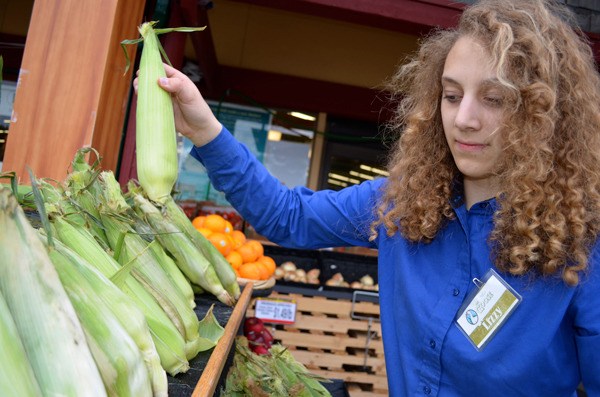Everyone remembers his or her first job, but for teens on South Whidbey a job can be hard to find.
Charlie McKissic, the Goose Community Grocer store manager, has noticed a change in the average employment age over his career in food retail. In the 1970s and ’80s, teenagers held a majority of the grocery jobs, from baggers to floor and courtesy clerks. This trend shifted in the last decade when the economy tanked and more adults began to fill these positions.
The Goose staffs approximately 60 employees; four or five of these workers are aged 16 to 19. In the little more than one month McKissic has been employed as store manager, several teenagers have applied for jobs. He usually does not hire based solely on someone’s experience. In many entry-level positions, a teenager will be considered on the same basis as an adult, he said.
However, there is a restriction on how many hours a teenager can work while balancing their studies and school activities.
McKissic believes school is another reason why there are fewer teenagers employed. Many parents don’t want their kids working outside of school because it interferes with studying and extracurricular activities, he said.
In some of his previous managerial jobs, McKissic observed that many teenagers did not apply for part-time employment. Yet, he says this doesn’t appear to be as large of an issue on South Whidbey.
“I don’t know if that is because the economy is getting better or because it’s just the nature of South Whidbey,” he said.
The American Community Survey conducted in 2012 by the U.S. Census Bureau found that 35 percent of males aged 16 to 19 are unemployed in Island County, compared to 8.3 percent of females aged 16 to 19 years old. Industry positions, which are generally more male dominated, were hit the hardest during the recession, said Anneliese Vance-Sherman, regional labor economist for Washington state. This resulted in a larger number of unemployed teenage boys, she added. The low percentage of unemployed females in Island County may result from inherent errors in the study. When a study consists of a smaller sample population, there is more room for sampling error, Vance-Sherman said.
Teenagers lack experience and are at a competitive disadvantage, she said. Therefore, teens are being pushed out of the workforce. In a recession and recovery period, younger workers are always affected the most.
The job market in Island County was hit harder in comparison to other counties in Washington. The American Community Survey estimates 29.1 percent of teen males and 23.3 of teen females are unemployed in King County. In Snohomish County, the unemployment rate for teenage boys is 33.8 percent and the rate for teenage girls is 18.6 percent, according to the survey conducted by the U.S. Census Bureau in 2012. Vance-Sherman said much of the labor force in Island County makes the commute to King and Snohomish counties, where there are more jobs available. In general, the job market in Island County has taken longer to bounce back than in other counties.
According to a 2012 study conducted by the Brookings Institution, the teen employment rate in Seattle was 25 percent, while the overall unemployment rate for teenagers in Washington is 34.5 percent — the third highest in the country.
Working teens are familiar with the difficulties of finding a job on South Whidbey.
Lizzy Hanzelka, a junior at South Whidbey High School and courtesy clerk at the Goose, said businesses seem to prefer hiring adults. She gained her position through a recommendation from an employee higher up in the company.
South Whidbey junior, Meaghan de Wolf, works 12 hours a week as a courtesy clerk at Payless. She says it has been challenging to balance her busy school schedule with her work schedule, but that she has managed OK. de Wolf applied for the courtesy clerk position last summer and after a few months she received a call to schedule an interview. She began at Payless in August. de Wolf believes finding employment is more challenging for teens who live on South Whidbey because they have fewer job options than in cities such as Lynnwood and Seattle.
Tyler Russell, a senior at South Whidbey High School, applied for his first job at the Star Store and was hired as a courtesy clerk. He also said that getting hired on the South End is more challenging for teens. Many of his friends are still seeking jobs.
The Star Store typically employs teenagers as courtesy clerks, which are entry-level positions. The number hired has stayed consistent, even throughout the recession. Hope still exists for a South Whidbey teen trying to find employment.
“It’s a necessity, you have to have them,” Star Store Manager Aaron Kanauer said. “They are the back bone of the store in a lot of ways.”



